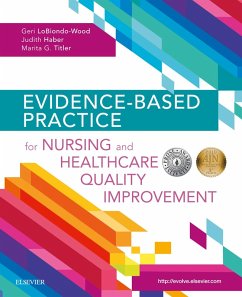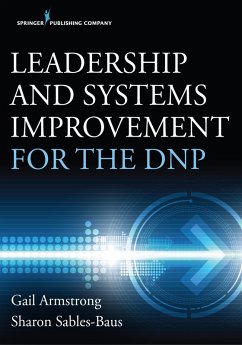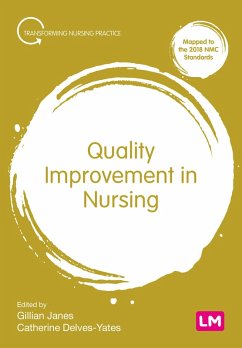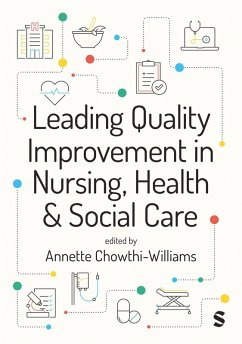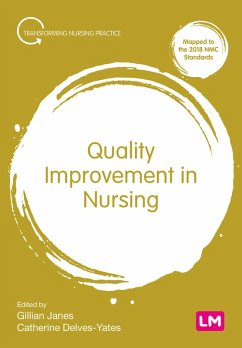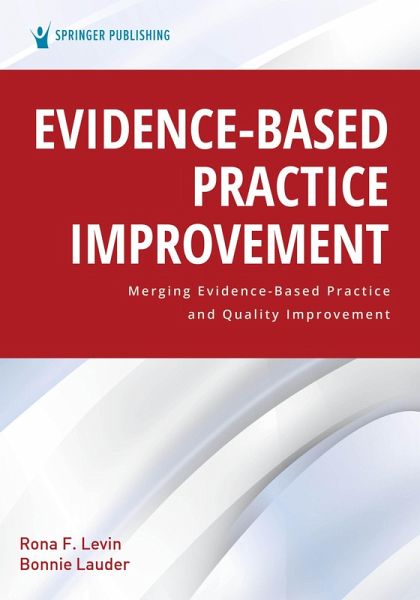
Evidence-Based Practice Improvement (eBook, ePUB)
Merging Evidence-Based Practice and Quality Improvement
Redaktion: Levin, Rona; Lauder, Bonnie

PAYBACK Punkte
35 °P sammeln!
Describes a superior model to guide empirical practice improvement projectsThis unique text provides the academic and clinical healthcare communities with a tested, practical, and successful model (EBPI+) to steer evidence-based practice improvement projects. The model--tested in multiple clinical settings--is distinguished from similar prototypes by its integration of the best EBP and quality/performance improvement principles (QI), resulting in a highly practical and comprehensible model for guiding students' and clinicians' work to improve quality outcomes in healthcare.The book emphasizes ...
Describes a superior model to guide empirical practice improvement projects
This unique text provides the academic and clinical healthcare communities with a tested, practical, and successful model (EBPI+) to steer evidence-based practice improvement projects. The model--tested in multiple clinical settings--is distinguished from similar prototypes by its integration of the best EBP and quality/performance improvement principles (QI), resulting in a highly practical and comprehensible model for guiding students' and clinicians' work to improve quality outcomes in healthcare.
The book emphasizes the need for collaboration among all stakeholders, particularly those in different disciplines with different perspectives, to provide greater clarity and enhance improvement work in a clinical agency. It features a blueprint for guiding healthcare improvements based on evidence that incorporates potential changes of direction midstream. The book also introduces tools for the evaluation of organizational commitment, stakeholder choice, and sustainability of improvement projects. Section One of the text focuses on the background and development of the original EBPI model, followed by, in Section Two, an elaboration of the components of the new enhanced model, EBPI+. Chapter authors in Section Three describe how they used the components of the EBPI model, discussing lessons learned from its use. This section, connecting the theoretical basis for this work with real-world applications, includes a template that readers can use to facilitate their own projects. The final section investigates future approaches to improvement work. Comprehensive appendices provide useful tools for students and clinicians to use in developing, implementing, and evaluating any EBPI+ projects.
Key Features:
This unique text provides the academic and clinical healthcare communities with a tested, practical, and successful model (EBPI+) to steer evidence-based practice improvement projects. The model--tested in multiple clinical settings--is distinguished from similar prototypes by its integration of the best EBP and quality/performance improvement principles (QI), resulting in a highly practical and comprehensible model for guiding students' and clinicians' work to improve quality outcomes in healthcare.
The book emphasizes the need for collaboration among all stakeholders, particularly those in different disciplines with different perspectives, to provide greater clarity and enhance improvement work in a clinical agency. It features a blueprint for guiding healthcare improvements based on evidence that incorporates potential changes of direction midstream. The book also introduces tools for the evaluation of organizational commitment, stakeholder choice, and sustainability of improvement projects. Section One of the text focuses on the background and development of the original EBPI model, followed by, in Section Two, an elaboration of the components of the new enhanced model, EBPI+. Chapter authors in Section Three describe how they used the components of the EBPI model, discussing lessons learned from its use. This section, connecting the theoretical basis for this work with real-world applications, includes a template that readers can use to facilitate their own projects. The final section investigates future approaches to improvement work. Comprehensive appendices provide useful tools for students and clinicians to use in developing, implementing, and evaluating any EBPI+ projects.
Key Features:
- Describes a practical and successful model incorporating the best of EBP and QI approaches (EPBI+) for improving quality outcomes in healthcare
- Incorporates a strong focus on how to determine and engage project stakeholders and provides tools for effective decision making
- Delineates specific methods to develop protocols for a small test of change prior to larger pilot studies
- Delivers approaches/strategies for monitoring and evaluating sustainability
- Discusses how to assess organizational commitment and conduct stakeholder analyses
- Creates examples that use each component of EBPI+ as a template for readers
- Emphasizes the "how to" of implementation more than other competitive models
Dieser Download kann aus rechtlichen Gründen nur mit Rechnungsadresse in A, D ausgeliefert werden.




